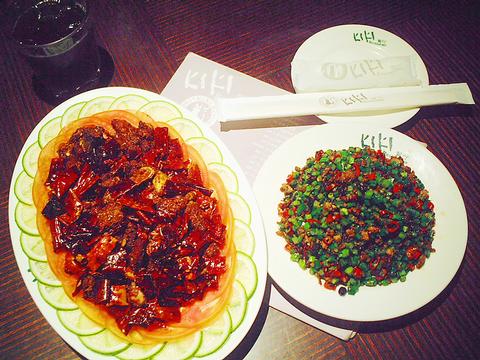While restaurants specializing in hot and spicy Sichuan cuisine are prevalent throughout Taiwan's bustling metropolises, the Kiki Restaurant chain has, over the past decade, built up a reputation not only as one of the classiest of Taipei's numerous Sichuan joints, but also one of the most contemporary.
Kiki offers diners a feast of Sichuan food in an environment far-removed from that of many of the traditional red tableclothed spit-and-sawdust Sichuan joints. With its dim lighting and dark wood furniture, Kiki has all the trappings of a modern European-style eatery rather than that of an Oriental joint. Oriental it is, however, only Oriental with a spicy twist.
"Our aim is to offer diners traditional Sichuan cuisine with a modern twist in even more contemporary surroundings," said employee, You En-lun (

PHOTO: GAVIN PHIPPS, TAIPEI TIMES
The menu is packed with dishes that will set the mouth of even the hardiest chili eater ablaze. And while dishes such steamed and fried egg with pork (
Some of the joints more popular hotter dishes include Taiwanese eel fried with hot chili and pork (
Not all of the joint's dishes are laden with peppers, however. Should diners wish to eat without losing their sense of taste, then dishes such as beef strips with ginger (
While the chiefs at Kiki pride themselves on their spicy dishes, they will make an exception for diners who can't take such large amounts of chili. All the dishes are available with less chili on request.
At present there are four branches of Kiki scattered throughout Taipei. And while they all serve the same fiery selection of food, the largest and most popular branch is the Fuhsing branch, where on occasion celebrities can be spotted mopping their brows as the chili effect kicks in.

April 14 to April 20 In March 1947, Sising Katadrepan urged the government to drop the “high mountain people” (高山族) designation for Indigenous Taiwanese and refer to them as “Taiwan people” (台灣族). He considered the term derogatory, arguing that it made them sound like animals. The Taiwan Provincial Government agreed to stop using the term, stating that Indigenous Taiwanese suffered all sorts of discrimination and oppression under the Japanese and were forced to live in the mountains as outsiders to society. Now, under the new regime, they would be seen as equals, thus they should be henceforth

Last week, the the National Immigration Agency (NIA) told the legislature that more than 10,000 naturalized Taiwanese citizens from the People’s Republic of China (PRC) risked having their citizenship revoked if they failed to provide proof that they had renounced their Chinese household registration within the next three months. Renunciation is required under the Act Governing Relations Between the People of the Taiwan Area and the Mainland Area (臺灣地區與大陸地區人民關係條例), as amended in 2004, though it was only a legal requirement after 2000. Prior to that, it had been only an administrative requirement since the Nationality Act (國籍法) was established in

Three big changes have transformed the landscape of Taiwan’s local patronage factions: Increasing Democratic Progressive Party (DPP) involvement, rising new factions and the Chinese Nationalist Party’s (KMT) significantly weakened control. GREEN FACTIONS It is said that “south of the Zhuoshui River (濁水溪), there is no blue-green divide,” meaning that from Yunlin County south there is no difference between KMT and DPP politicians. This is not always true, but there is more than a grain of truth to it. Traditionally, DPP factions are viewed as national entities, with their primary function to secure plum positions in the party and government. This is not unusual

US President Donald Trump’s bid to take back control of the Panama Canal has put his counterpart Jose Raul Mulino in a difficult position and revived fears in the Central American country that US military bases will return. After Trump vowed to reclaim the interoceanic waterway from Chinese influence, US Defense Secretary Pete Hegseth signed an agreement with the Mulino administration last week for the US to deploy troops in areas adjacent to the canal. For more than two decades, after handing over control of the strategically vital waterway to Panama in 1999 and dismantling the bases that protected it, Washington has